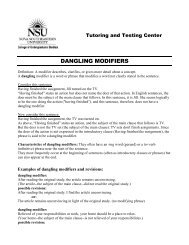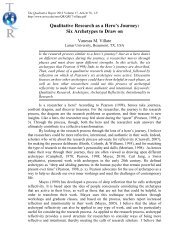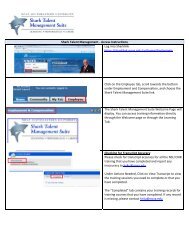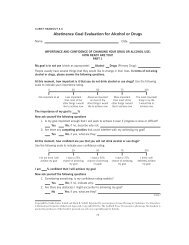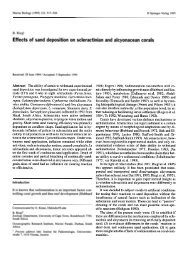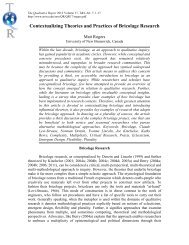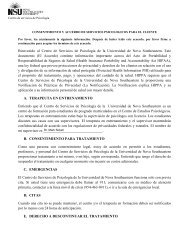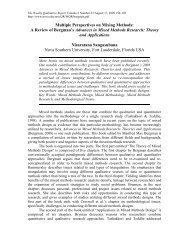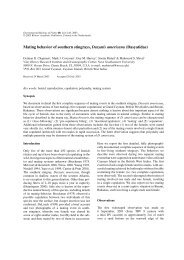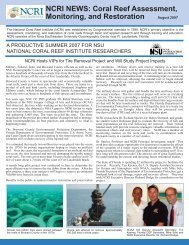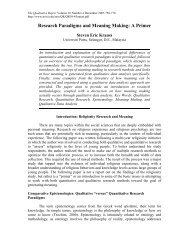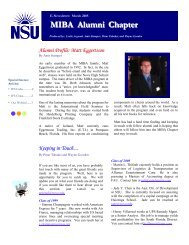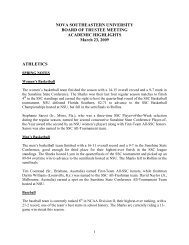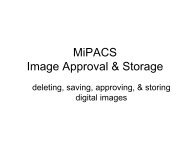11th ICRS Abstract book - Nova Southeastern University
11th ICRS Abstract book - Nova Southeastern University
11th ICRS Abstract book - Nova Southeastern University
Create successful ePaper yourself
Turn your PDF publications into a flip-book with our unique Google optimized e-Paper software.
23.1014<br />
Second And Third Order Management Issues in South Sinai Protected Reef Areas<br />
Rupert ORMOND* 1 , Wera LEUJAK 2 , Mohammed SALEM 3 , Ayman MABROUK 3<br />
1 SaveourSeas Foundation, West Lothian, United Kingdom, 2 <strong>University</strong> Marine Biological<br />
Station Millport, <strong>University</strong> of London, Isle of Cumbrae, United Kingdom, 3 South Sinai<br />
Protectorates, Egyptian Environmental Affairs Agency, Sharm El Sheikh, Egypt<br />
Over the last 15 years the whole of the Egyptian coast of the Gulf of Aqaba has been<br />
incorporated within a series of Marine Protected Areas. The relevant authorities<br />
(Egyptian Environmental Affairs Agency) have effectively implemented a series of first<br />
order management objectives. However the region has been promoted so successfully<br />
that some reef areas are now subject to a greater intensity of visitor use than any others<br />
worldwide.<br />
Quantitative studies have elucidated a series of second order management issues:<br />
i. The most popular reef sites are being so heavily used that, through incidental trampling<br />
and breakage, coral cover has declined, and at some sites the reef assemblage been<br />
changed.<br />
ii. Largely as a consequence of this impact, and Crown-of-thorns starfish outbreaks, coral<br />
cover now appears to be in decline across the region.<br />
iii. Public awareness initiatives have increased the care that visitors from traditional<br />
tourist source countries take to avoid coral damage, but there has been a recent large<br />
increase in the proportion of other tourists with little knowledge of or concern for marine<br />
life.<br />
iv. With even larger numbers of developments and visitors, infringements of MPA<br />
regulations are becoming increasingly evident.<br />
In response, the EEAA has supported research addressing a number of key third order<br />
issues:<br />
a) What are the carrying capacities of different types of reef area? Data suggest that<br />
ecological carrying capacities may not be clearly defined, while at heavily used sites<br />
social carrying capacity may be the more important issue.<br />
b) How can the behaviour of visitors with little concern for coral protection be more<br />
effectively controlled? Sanctions against tour operators and tour group leaders may be as<br />
important as positive publicity campaigns.<br />
c) How effectively can the tools of integrated coastal zone management be applied to<br />
mange visitor behaviour as well as tourist development?<br />
23.1015<br />
Community Participation in Coral Reef Management On Phuket Island, Thailand<br />
Pitul PANCHAIYAPHUM 1 , Hansa CHANSANG* 2 , Krawi ONGSORANACOMKUL 3 ,<br />
Anuwat NATEEWATTANA 4<br />
1 Department of Marine and Coastal resources, Phuket, Thailand, 2 Phuket Marine<br />
Biological Center, Phuket, Thailand, 3 Department of Fisheries, Phuket, Thailand,<br />
4 Department of Marine and Coastal Resources, Bangkok, Thailand<br />
In Thailand a pilot project in community participation in managing reefs of Phuket Island<br />
has been initiated since 1992. The communities along the west coast have been benefit<br />
from tourism by changing their occupation from coastal fisheries to tourism related<br />
occupation. They were encouraged in setting up associations which participated in<br />
various activities i.e., installation and maintenance of mooring buoys and assisting<br />
authorities in surveillance of illegal activities. The network of associations has been<br />
formed to exchange information and experiences among various groups. Increasingly the<br />
network began to settle the conflicting issues of reef resources among themselves. Parts<br />
of the activities were also supported by local government and private sectors. At present,<br />
the communities still depend upon supports from authorities in various ways i.e. some<br />
financial and logistic supports, and information regarding successful management<br />
elsewhere.<br />
In conclusion it is shown that transferring management responsibility of reef resources to<br />
local communities is possible but it is a long term process. Close cooperation between<br />
government officials and communities is the key of success.<br />
Poster Mini-Symposium 23: Reef Management<br />
23.1016<br />
Improving Governance Of Marine Protected Areas Through Inter-Local Government<br />
Collaboration in Central Philippines<br />
Rizaller AMOLO* 1 , Rose-Liza EISMA-OSORIO 2<br />
1 Local Governance for Coastal Management Project, Coastal Conservation and Education<br />
Foundation Inc., Cebu City, Philippines, 2 Coastal Conservation and Education Foundation Inc.,<br />
Cebu City, Philippines<br />
Establishment of no-take marine protected areas (MPAs) in the Philippines has become an<br />
efficient approach to address coral reef degradation and decline in reef fishery production by<br />
numerous local governments. In Central Visayas, Philippines, over 400 MPAs both declared by<br />
local ordinances and through the National Integrated Protected Areas System Act were<br />
established to improve marine habitats and increase fishery resources. However, only 20-25%<br />
has been effectively managed by local government units (LGUs) along with their constituents.<br />
Achieving its objectives, there is a need for LGUs to collaborate strategies to improve MPA<br />
management and maximize benefits. This paper examines the effect of collaboration of the<br />
LGUs in Southern Cebu and Siquijor province, in improving reef management by looking into<br />
various outcomes of effective governance. A 3-year biophysical monitoring of MPAs showed<br />
significant changes in benthic community and reef fish population. MPA governance rating has<br />
improved overtime. Effective coastal law enforcement within and outside MPAs has increased.<br />
Various strategies such as collecting user fee, joint enforcement effort, and effective community<br />
education and information dissemination were found to also be an emerging approach to<br />
increase support in management. Lesson learned in inter-local government collaboration<br />
includes: clarify organizational requirement prior to effective program implementation and<br />
effective joint law enforcement plays a crucial role to sustain collaborative support.<br />
23.1017<br />
Recreational Diving Management in the Coral Reefs of Cozumel, Mexico<br />
Luis SANTANDER* 1<br />
1 Division de Desarrollo Sustentable, Universidad de Quintana Roo, Cozumel, Mexico<br />
The general objective is twofold: i) a review of the management principles and actions aimed to<br />
reduce the negative impacts of recreational diving in coral reefs; and, ii) point out the<br />
shortcomings of such principles and actions in Cozumel’s MPA (Marine Protected Area).<br />
The paper has a presentation and discussion of two principles and strategies for MPA: zoning<br />
and carrying capacity. The study includes a selection of other specific measures and actions<br />
designed to reduce the environmental impacts of recreational diving and it also deals with the<br />
characteristics and tendencies of the industry of recreational diving.<br />
After the analysis of the international experiences in the management of recreational diving in<br />
coral reefs in MPA, the analysis is centered in Cozumel’s MPA, mainly with data obtained from<br />
monitoring over 350 divers and 82 diving groups.<br />
The quantitative results of physical contacts and sediment removals due to divers is explained in<br />
relation to behaviours and omissions of instructors and diving guides that fall beyond the scope<br />
of principles, policies and actions contained by management plans for recreational diving.<br />
The main conclusion is that general management principles of MPA are usefull and important<br />
but have shortcomings. For example, i) carrying capacity (number of divers) can change<br />
drastically with different divers’ profile and diving practices, or ii) restrictions in a zone not<br />
necessarily mean that the consequences of negative impacts in a nearby area of intensive use,<br />
are absent on the former. When it comes to standard actions to protect reefs from divers the<br />
main limitations come from the great diversity of physical and biological features of sites and<br />
from the different behaviours of divers.<br />
490



